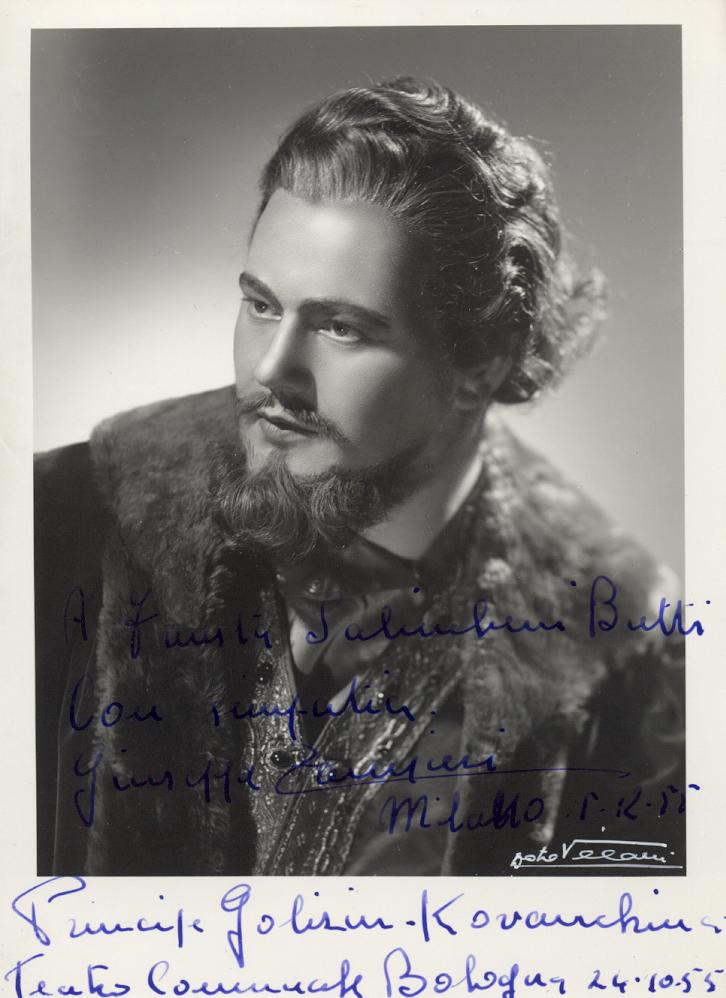I got complaints from Clemens Jabloner and Ross Halper for my classification of Zampieri as a comprimario.
Steve Slezak wrote also positive comments on him. Peter Groeger provided me with a defense piece
on Zampieri. I have moved him to the Italian tenors list with recordings by him both as comprimario and as lead tenor.
Zampieri was a house tenor in Vienna. Clemens Jabloner provided me with his Vienna repertory, taken from
Chronik der Wiener Staatsoper, 1945–1995 by Harald Hoyer. Here it is:
(number of performances, first and last evening)
Andrea Chénier (5/11 February 1961 – 21 September 1963)
Un ballo in maschera (31/26 September 1958 – 12 March 1969)
La bohème (26/7 April 1960 – 30 October 1968)
Capriccio (Sänger) (9/15 May 1960 – 20 December 1961)
Carmen (12/8 January 1960 – 27 November 1963)
Cavalleria rusticana (60/8 March 1959 – 6 October 1974)
Don Carlo (54/19 September 1958 – 6 April 1974)
Falstaff (Fenton) (6/20 September 1957 – 21 November 1967)
Faust (7/23 February 1963 – 24 March 1968)
Fidelio (Florestan) (10/18 September 1957 – 17 February 1963)
Die Fledermaus (Alfred) (27/31 December 1980 – 1 January 1974)
La forza del destino (13/24 May 1963 – 18 November 1970)
Fürst Igor (6/6 February 1960 – 18 December 1960)
Macbeth (2/8 May 1972 – 17 February 1973)
Madama Butterfly (72/19 September 1957 – 23 November 1972)
Otello (Cassio) (46/15 April 1957 – 21 June 1974)
Rigoletto (42/7 November 1958 – 19 March 1973)
Der Rosenkavalier (Sänger) (7/1 January 1960 – 3 January 1961)
Simon Boccanegra (5/24 September 69 – 23 January 1972)
Tosca (27/6 November 1957 – 17 April 1972)
La traviata (Gaston) (1/20 June 1957)
La traviata (Alfredo) (60/5 October 1957 – 11 October 1970)
Turandot (Calaf) (2/24 January 1964 – 4 February 1967)
Cavalleria rusticana (Matačić), Fürst Igor (Matačić), Die Fledermaus (Karajan) and Capriccio (Böhm)
were first nights, also Otello (Karajan, with Rysanek, Del Monaco, Colzani).
A defense of Zampieri by Peter Groeger
I am very sorry, but I must urgently contradict your classification of Giuseppe Zampieri as a comprimario, because this is only
correct for the years 1951 to 1957 when he belonged to La Scala Milano. From 1957/58 till the early seventies Zampieri was one
of the leading tenors of the Vienna State Opera House. In that period, he sang 23 roles in more than 500 performances, among them
70 Pinkerton, 60 Alfredo (Traviata), 60 Turiddu, 54 Don Carlo as well as 10 Florestan and 27 Alfred in Fledermaus. Zampieri, as
one of the favourite tenors of Herbert von Karajan, was engaged in many of Karajan`s famous productions of that time:
For example in Salzburg: Florestan, Fenton, Sänger in Rosenkavalier and the tenor part in Verdi`s Requiem; and in Vienna:
Cavaradossi in the legendary production of Tosca – 1958 with Tebaldi and Gobbi – which is still performed!
When Karajan became the head of the Vienna State Opera House in 1956, he started a close cooperation with La Scala, an activity
which some people and also some critics took as an offence against the German speaking singers in the Italian repertoire –
for example Rosvaenge. So at the beginning and only for a short time, Zampieri and others – even the great Bastianini
– were confronted with unfair reviews. But very soon Zampieri and his famous colleagues like Bastianini, Di Stefano,
Simionato, Bergonzi and so on became beloved favourites of the Vienna opera enthusiasts.
In the USA, Zampieri was a guest star in San Francisco – there is an excellent Ballo in maschera together with Brouwenstijn
and Bastianini from 1961 – and at the Met, where he made his debut 1961 in Tosca with Milanov and London.
Giuseppe Zampieri had one of the most beautiful voices of the fifties and sixties, in a time when stars like Di Stefano, Corelli,
Del Monaco and so on were on top of their careers. Zampieri could have made a comparable international career, but he decided to
stay mainly in Vienna as the center of his activity.
A lot of mainly live recordings – Florestan, both Alfredo and Alfred, Gabriele Adorno, Riccardo only to mention some of
them – give evidence of his outstanding voice.
I hope I could enlarge the knowledge about this artist.
With best regards
Peter Groeger, Vienna, Austria
